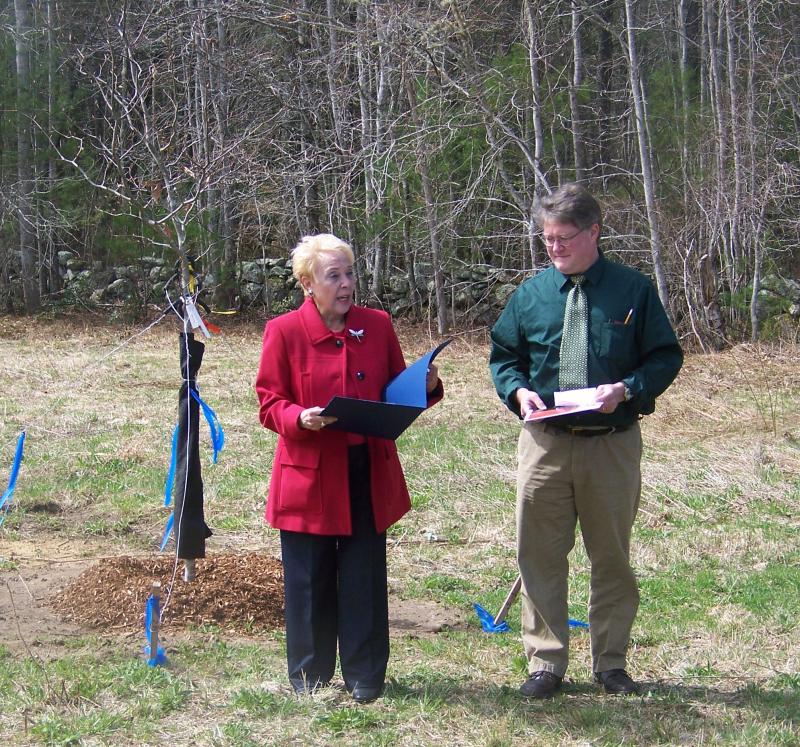Seeds that survived A-bomb headed for Rochester soil
When Mike McCue needed a hardy tree for an Arbor Day ceremony, he started his search online. Instead of settling for an oak or an elm, McCue ended up in the custody of saplings grown from the seeds of a ginkgo biloba tree that survived the atomic bombing of Hiroshima, Japan in 1945.
This fall, at least one of those saplings will be planted near Town Hall.
McCue, Rochester’s town administrator, made the announcement at an Arbor Day celebration held April 24 in Church’s Field. That event featured the dedication of an American beech tree purchased with funds donated by the town's Tree Warden Jeff Eldridge.
To get the ginkgo saplings, all McCue had to do was ask.
Two years ago, when he was Avon’s town administrator, McCue was searching for a new tree for that town’s Arbor Day ceremony.
Through research, he discovered that the ginkgo is known for its sturdiness and, in at least one case, proved indestructible.
“They are extremely hardy and can withstand pollution, sand, salt and all kinds of abuse,” McCue said. “Near the end of the article it mentioned that one had even survived the atomic bombing.”
As an avid gardener who also loves history, the historical and horticultural combination piqued McCue’s interest.
He discovered that the Green Legacy Hiroshima, a group backed by the United Nations, collects seeds from a 250-year-old ginkgo located roughly 1,500 yards from the A-bomb explosion. Green Legacy sends those seeds across the globe to spread a message of peace.
Fascinated with the idea of securing a ginkgo for Avon, but doubtful that he’d get a response, McCue emailed Green Legacy’s co-founder, Nassrine Azimi.
“I reached out and was surprised to receive a response,” McCue said. “[The ginkgos] are mostly given to national capitals and embassies.”
Trees grown from those seeds can be found at the International Red Cross Committee in Geneva, Switzerland and the Nuclear Age Peace Foundation in Santa Barbara, California.
The original plan called for having seeds delivered, but McCue said international regulations proved too onerous. Saplings, however, had less restrictions. That fact and a bit of serendipity helped land the ginkgo saplings in Massachusetts.
Azimi’s brother, Robert, happens to live in Wrentham. As a Mansfield resident, McCue’s town is just next door.
To get from Japan to Mansfield, the trees required a layover in San Diego where Azimi’s mother lives. Robert picked up the trees from his sister when the siblings flew out for a visit.
After that, the saplings were in McCue’s hands.
“It was easy as that,” he said.
Of the 12 saplings sent three are no longer viable. The remaining trees are being cared for in the Arnold Arboretum in Jamaica Plain.
McCue said he contacted the curator at the Arnold Arboretum to make sure the saplings would thrive.
“I didn’t want to take a chance,” he said.
At first, arboretum staff told him they were too busy for the project but soon changed their minds.
“Apparently this isn’t something the arboretum does, but because of the trees’ importance and the public outreach being done, they agreed,” McCue said.
Some of the saplings were planted in Avon. During a recent ceremony, a member of the Japanese consulate spoke. McCue said in addition to Rochester, trees will be planted at Tufts University and St. Anselm College (McCue’s alma mater).
McCue's Hiroshima trees are the only ones east of the Mississippi River, save for one planted at Kennesaw University in Georgia.
Friday’s celebration and the upcoming one in the fall were scheduled to meet Tree City U.S.A. requirements. McCue said he was surprised to learn Rochester hadn’t earned the designation.
“Of all the towns I’ve worked in Rochester would seem to be the most appropriate place to be a Tree City,” he said.
To become a Tree City a town must establish a tree board, an ordinance for tree care, a community forestry program and hold an Arbor Day observance. As a Tree City, more open space grants are available to towns, McCue said.
“Hopefully this will mark the first of many events that will grow in size as we get the word out,” McCue said.















